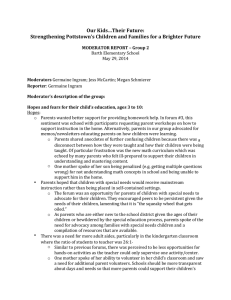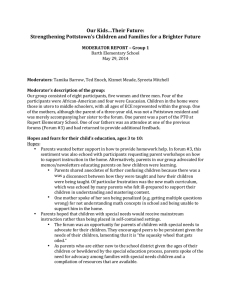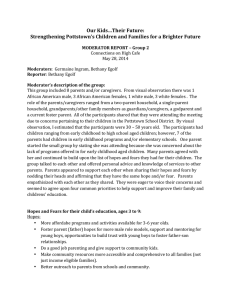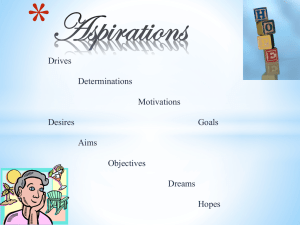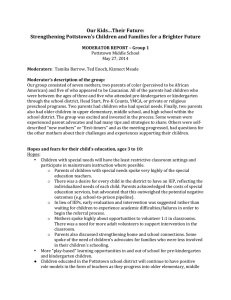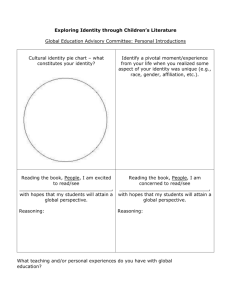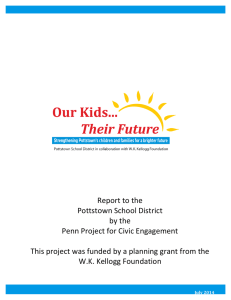Document 14559615
advertisement
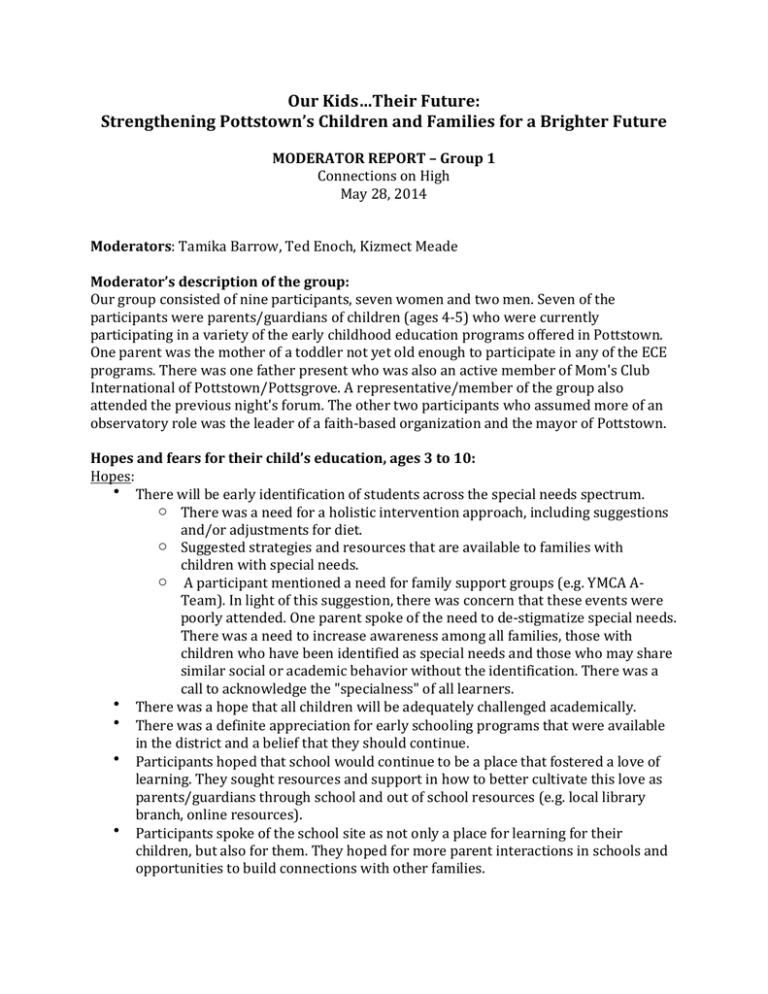
Our Kids…Their Future: Strengthening Pottstown’s Children and Families for a Brighter Future MODERATOR REPORT – Group 1 Connections on High May 28, 2014 Moderators: Tamika Barrow, Ted Enoch, Kizmect Meade Moderator’s description of the group: Our group consisted of nine participants, seven women and two men. Seven of the participants were parents/guardians of children (ages 4-­‐5) who were currently participating in a variety of the early childhood education programs offered in Pottstown. One parent was the mother of a toddler not yet old enough to participate in any of the ECE programs. There was one father present who was also an active member of Mom's Club International of Pottstown/Pottsgrove. A representative/member of the group also attended the previous night's forum. The other two participants who assumed more of an observatory role was the leader of a faith-­‐based organization and the mayor of Pottstown. Hopes and fears for their child’s education, ages 3 to 10: Hopes: • There will be early identification of students across the special needs spectrum. o There was a need for a holistic intervention approach, including suggestions and/or adjustments for diet. o Suggested strategies and resources that are available to families with children with special needs. o A participant mentioned a need for family support groups (e.g. YMCA A-­‐ Team). In light of this suggestion, there was concern that these events were poorly attended. One parent spoke of the need to de-­‐stigmatize special needs. There was a need to increase awareness among all families, those with children who have been identified as special needs and those who may share similar social or academic behavior without the identification. There was a call to acknowledge the "specialness" of all learners. • There was a hope that all children will be adequately challenged academically. • There was a definite appreciation for early schooling programs that were available in the district and a belief that they should continue. • Participants hoped that school would continue to be a place that fostered a love of learning. They sought resources and support in how to better cultivate this love as parents/guardians through school and out of school resources (e.g. local library branch, online resources). • Participants spoke of the school site as not only a place for learning for their children, but also for them. They hoped for more parent interactions in schools and opportunities to build connections with other families. • Participants hoped that there would be a two-­‐way conversation between home and school. They hoped that they would be valued for their expertise in their children’s learning. Fears: • As we shared in the round, a grandparent shared a multilayered story of the struggles of supporting her grandchildren. Similar to other forums, there was a discussion of the shifting family dynamic and how the school district could support families where the image of the primary caregiver(s) varies. • Parents were concerned about there not being enough physical activities for younger children. This was similar to concerns at the previous day's forums where parents were concerned about the imbalance between social/extracurricular and academic foci of pre-­‐school/pre-­‐K programs. A benefit to participating in the forums was not only the cathartic experience of having their voices heard, but also being change-­‐oriented in helping to develop potential solutions. Participants began to brainstorm suggestions for addressing this concern: o Offering different daily specials/extracurricular activities similar to programmatic scheduling in the upper grades o Fostering a love of schooling early on through a variety of learning activities rather than rote academics o If scheduling adjustments are not able to be made, off-­‐setting the costs for children to be able to participate in extracurricular activities through community-­‐based organizations • Participants were concerned about support in addressing mental health concerns effectively in schools. • Although there were hopes regarding the differentiated support children would be able to receive through special education service, there were also concerns that: o Children would be labeled o Services that are no longer needed will be taken away. Parents were concerned that if concerns arose again, these services would no longer be available to their children o Parents wanted additional academic support in and out of school • Parents felt uninformed about what was happening in schools and how they could support. There was a need for more transparency. Participants advocated for family-­‐appropriate modes of communication (e.g. text, email) and that the selected mode should be updated annually. Finally, there was a request for more age/grade-­‐ appropriate targeted communication as past communications from the school district created unnecessary alarm when it was not applicable to their children’s learning contexts. Tensions: -­‐ Resources that work vs. those that do not Supports: things people identified as supporting their hopes • SEE ABOVE SUB-­‐BULLETS UNDER “HOPES” SECTION FOR ELABORATION Barriers : things people identified as leading to their fears or of getting in the way of reaching their hopes • SEE ABOVE SUB-­‐BULLETS UNDER “FEARS” SECTION FOR ELABORATION Programs: We asked participants to review the list of Pottstown ECE programs that have been offered and to speak to those they have participated in. What made these programs positive experiences for their families? In what ways could these programs be improved? • Head Start (formerly known as pre-­‐K Counts at the HS site) + Parents could not speak highly enough of the great teachers in the Head Start program + They appreciated that this was a free program offered to low-­‐income families that provided childcare and learning opportunities for full-­‐day academic instruction • Parent Literacy Nights + Literacy nights offered great tips for getting children ready for kindergarten -­‐ There were concerns when families had multiple school-­‐aged children as sessions ran concurrently and built upon previous content. Parents were forced to select which child’s sessions they wanted to attend for the series. -­‐ There were also no resources or childcare available for non-­‐school aged children limiting parents who had to make accommodations for younger siblings ! Need for a take home packet of resources to be used to support instruction in the home. Final synthesis of qualities, values, characteristics As we wrapped for the evening, participants spoke of the need for a parent program. The welcoming environment of Connections on High enabled them to meet other invested parents/guardians and to build connections given mutual concerns. Similar to the evening’s forums, participants envisioned a comparable parent program that could meet monthly for adult socialization, to discuss concerns, and to share resources. Participants sought better communication between home and school. Teachers were experts on children in schools. Parents sought to be valued for the expertise they brought in speaking to their children’s needs. Finally, the needs of students with special needs was a reoccurring theme throughout our discussion. The needs for holistic strategies and supports to address the specific needs of this student demographic, both in school and out of school, were a welcomed resource.
